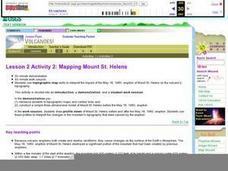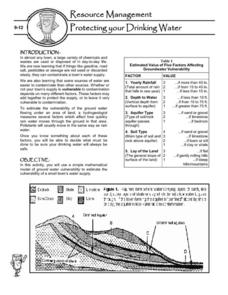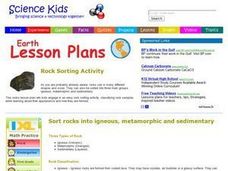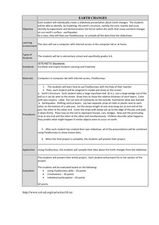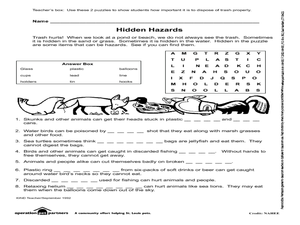Curated OER
Lesson 2 Activity 2: Mapping Mount St. Helens
Students use topographic map skills to interpret impact of the May 18, 1980 eruption of Mount St. Helens on the volcano's topography, and draw profile views of Mount St. Helens before and after the May 18, 1980, eruption.
US Environmental Protection Agency
Protecting Your Drinking Water
Having a clean, reliable source of drinking water is essential for any community, but in many cases this is easier said than done. Engage young environmentalists in exploring the five factors affecting vulnerability of a groundwater...
NASA
Introduction to Astronomy
Welcome to your new job as an astrophysicist, astrobiologist, engineer, or research scientist at NASA. Your job is to search for alien life in our solar system! Throughout a unit of activities, learners search the galaxy through...
Curated OER
Being Responsible for Earth
Eighth graders explore the characteristics of responsibility. In this character lesson plan, 8th graders complete a self-evaluation. Students view a responsibility video. Students write a newspaper article on selected environmental issue.
K20 LEARN
Water We Going To Do? Floodplains And Watershed Management
How has human activity affected Earth's watersheds? An action-packed lesson plan, part of the K20 Center, examines water's ability to go with the flow regardless of what is in its path. Scholars build model watersheds, examine time-lapse...
Howard Hughes Medical Institute
Geological History of Oxygen
Earth didn't always have oxygen, so what caused the change that allows humans to live here? Learn about the change in O2 levels throughout geological history through an interactive graph. Each section offers greater detail on the changes...
Curated OER
Gaia: The Wisdom of the Earth
Learners are introduced to Gaia theory of natural homeostasis. They graph Earth's temperatures over time, construct terrariums or monitor the outdoor environment. Related videos titles are suggested, but may be outdated. The objectives...
Curated OER
Rock Cycle Activity
A few of the components of this lesson plan are not possible to carry out because the rock cycle diagram and challenge handouts are not included. Hopefully, you already have your own rock cycle diagram or worksheet to use as a concept...
Curated OER
Sun Activity
In this space science worksheet, learners find the answers to the questions concerning the topic of the sun and they label the diagram for the sun.
Curated OER
Earth's Plate Tectonics
Students identify the different layers of the Earth. In this earth science instructional activity, students create a model of the crusts and continents. They explain how plates movement cause earthquakes and volcanoes.
Curated OER
Rock Sorting Activity
Students organize rock samples according to their properties. In this earth science instructional activity, students predict whether they are igneous, metamorphic or sedimentary. They compare their prediction with the actual type.
Curated OER
Harvesting Oil from the Earth
Fourth graders research sources of fossil fuels especially oil while determining how scientists take core samples from an Earth model. They look at oil consumption and production in the US and throughout the world.
Curated OER
Earth to Saturn, Earth to Saturn!
Students compare and contrast the characteristics of Earth and Saturn. They practice writing analogies using those characteristics. They complete a worksheet to end the lesson.
Curated OER
Google Earth Scavenger Hunt
Students complete activities to learn how to use Google Earth and study Alaska. In this Google Earth lesson plan, students complete a Google Earth scavenger hunt to find facts about Alaska. Students complete two worksheets for the topic.
Curated OER
Earth Changes
Students investigate the earth's structural layers by participating in hands-on activities. They identify the earth's structure and investigate earthquakes.
Curated OER
The Earth is Tilted, What Does that Mean?
Students examine the tilt in the Earth's revolution around the sun. Using that information, they draw a picture and label the indirect and direct rays of the sun. In groups, they answer discussion questions and complete an assessment...
Curated OER
Seasonal CEENBoT
Students simulate the Earth's revolution around the sun using CEENBoT. In this earth science instructional activity students calculate the Earth's distance in AU and it's speed of revolution. They explain how the Earth's movement cause...
Curated OER
The Dynamic Earth
Students use the Internet to investigate earthquakes and plate tectonics. In this plate tectonics lesson, students complete a web quest with multiple links and activity types relating to earthquakes and volcanoes. They connect the...
Curated OER
Save the Earth: It's Everyone's Home!
Students complete activities to become more aware of environmental issues and the effect on plants and animals. In this environmental issues instructional activity, students use a globe to discuss issues with the environment. Students...
Curated OER
Let's Clean Up Our Act and the Earth!
Students complete activities that help clean up the Earth and protect the environment. In this Earth protection lesson, students go outside and listen to the environment. Students discuss their observations and their role in protecting...
Curated OER
Earth's Tilt Creates Seasons
Pupils examine how the Earth's tilt creates the seasons. In this seasons lesson, students study a diagram that shows the rotation of the earth around the sun and how it tilts during the rotation. They answer 4 discussion questions and...
Curated OER
Adding the Moon: Using a Classroom Model to Explore the Movement of the Sun, Earth, and Moon
Students observe and discuss motions of the Earth and the Moon as they spin and orbit the Sun.
Curated OER
Earth's Radiation Budget
Twelfth graders explore the Earth's radiation budget using Earth radiation Budget Experiment (ERBE) data archived at the IRI/LDEO Climate Data Library. They use photometers and light sources to work through several hands-on activities...
Curated OER
Magnetometer Extension Activities
Students observe magnetic fields and locate the position of "ore deposits" patterns using models and maps. In this magnetometer lesson students complete a hands on activity and a reading/writing exercise.


